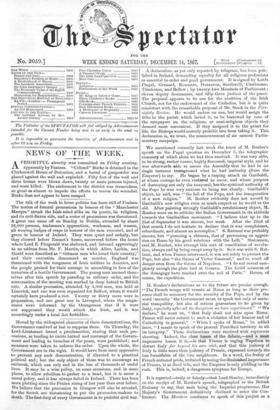The talk of the week in home politics has been
still of Feniaus. The notion of funeral processions in honour of the "Manchester Martyrs" struck the Irish mind alike on its poetic, its religious, and its anti-Saxon side, and a series of processions was threatened. A great one came off on Sunday in Dublin, attended by about 16,000 persons, tradesmen's apprentices, workmen, and women, All wearing badges of crape in honour of the men executed, and of green in honour of Ireland. They were quiet and orderly, but they cheered before Emmet's house, uncovered before the house where Lord E. Fitzgerald was sheltered, and listened approvingly to an address from Mr. F. Martin, in which Allen, Larkin, and Gould were described as "virtuous men who loved their country," and their execution denounced as murder, England was threatened with the vengeance of Irish soldiers in America, and the people praised for their courage in assembling in face of the terrorism of a hostile Government. The young men amused them- selves after this speech by parading in military order, and the conversation of the meeting was marked by deep hatred to British rule. A similar prodession, attended by 4,000 men, was held at Limerick, and ohe was even organized for Belfast, where it would certainly have produced a riot. Twenty or thirty more were in preparation, and one great one in Liverpool, where the magis- trates were informed by the Orangemen that if it were not suppressed they would attack the Irish, and it was accordingly under a local Act forbidden.






































